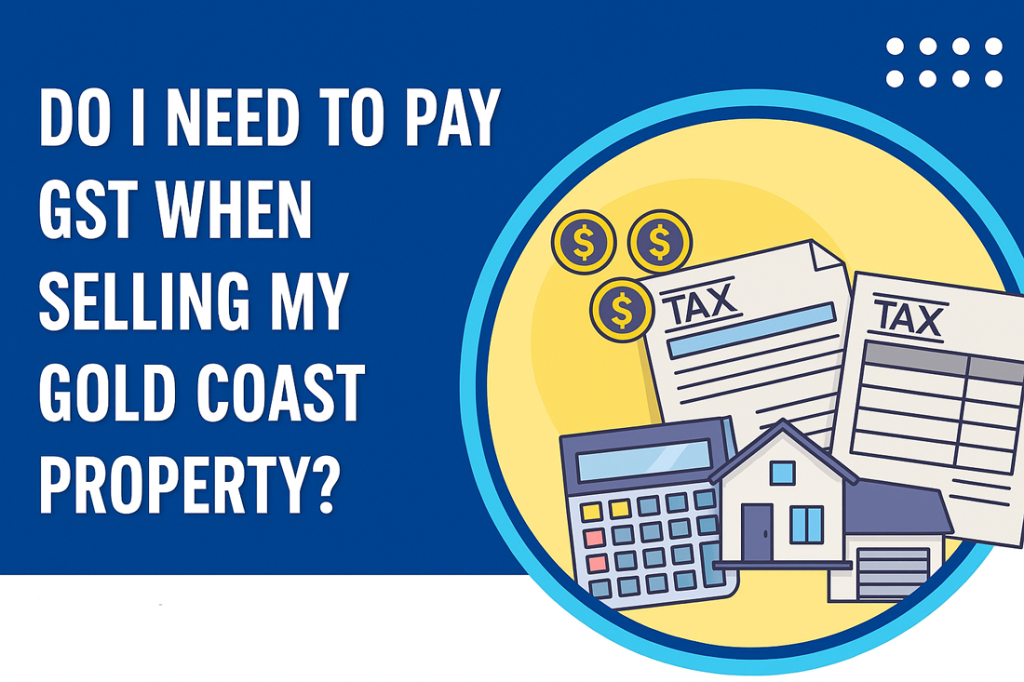
Do I Need to Pay GST When Selling My Gold Coast Property?
No, in most cases, you won’t need to pay GST when selling your Gold Coast property, especially if it’s an existing residential home. However, GST may apply if you’re selling new residential premises, vacant land, or commercial property, particularly if you’re registered for GST or required to be.
Paying GST when selling your Gold Coast property depends on the type of property and your seller status. Most residential homeowners selling their primary residence won’t need to pay GST. However, if the property is new, part of a development, or you’re registered for GST (such as a builder or investor), the rules may change.
Understanding GST Implications When Selling Your Gold Coast Property
Selling a property on the Gold Coast? You might be focused on market timing, pricing, and presentation, but have you considered the potential GST (Goods and Services Tax) implications?
While GST doesn’t apply to most standard residential property sales, there are some important exceptions and rules that could affect your sale price, contract, and bottom line. Whether you’re selling an investment property, developing for profit, or parting with commercial real estate, this guide will help you understand how GST could come into play—and how to manage it with confidence.
What Is GST and When Does It Apply?
GST is a 10% tax on the sale of most goods and services in Australia, including certain types of property. However, not all property sales are subject to GST.
In most standard residential property transactions, GST does not apply. However, if the property is newly built, commercial, or sold in the course of a business (e.g., property development or flipping), GST is likely to apply.
GST and Residential Property Sales
When GST Usually Doesn’t Apply
- You’re selling an existing residential property (not new construction).
- The property is your main place of residence.
- The sale is a private transaction, not part of a business.
When GST Might Apply
- The property is new residential premises (e.g., a newly built home or unit not previously sold or lived in).
- You’re a developer or builder selling new dwellings.
- The property is held in a business structure (e.g. a trust or company).
- The sale is part of your business activity (e.g., house flipping or multiple short-term investments).
GST and Commercial Property
Selling a commercial property (like an office, shopfront, or restaurant) on the Gold Coast? GST typically does apply, unless the sale qualifies as a “going concern”.
To qualify:
- The business must be operational at the time of sale.
- Both buyer and seller must be registered for GST.
- The business assets (property, lease, operations) must be transferred together.
If these conditions are met, the sale can be GST-free.
What Is the Margin Scheme?
The “Margin Scheme” in Australia is an alternative method for calculating the Goods and Services Tax (GST) you might be liable to pay when selling property as part of your business operations. Instead of paying GST on the total sale price of the property, eligible sellers only pay GST on the “margin,” which is generally the difference between the property’s selling price and its purchase price or an approved valuation.
This scheme is particularly relevant if you’re involved in property dealings like buying, selling, leasing, or developing, and your turnover from these activities exceeds the GST registration threshold ($75,000), making GST registration mandatory for you.
How the Margin Scheme Works:
Under the Margin Scheme, the GST you pay on your property sale is one-eleventh of the calculated margin.
There are two primary methods to calculate this margin:
Consideration Method: This is the most common method for properties acquired after July 1, 2000, and can also be applied to properties acquired before this date. The margin is simply the sale price minus the original purchase price. It’s important to note that the purchase price for this calculation excludes costs related to property development, legal fees, estate agent fees, and stamp duty.
Example: If you bought a property for $900,000 and sold it for $1.6 million, the margin would be $700,000. Your GST payable would be one-eleventh of $700,000.
Valuation Method: This method only applies to properties purchased before July 1, 2000. The margin is calculated as the sale price minus the property’s market value on July 1, 2000. To use this, you must obtain a written valuation report confirming the property’s market value as of that date.
Key Eligibility and Conditions for You to Use the Margin Scheme:
For you to be eligible to use the Margin Scheme, several crucial conditions must be met:
GST Registration: You must be registered for GST at the time of the sale.
Taxable Supply: The sale of your property must be a taxable supply.
Written Agreement: Both you, as the seller, and the purchaser must agree in writing to use the Margin Scheme. This agreement should be finalised by the time the property is supplied, which is usually at settlement. This is often included as a tick box in the contract of sale.
Previous Purchase Terms: You generally cannot use the Margin Scheme if you originally paid GST on the full purchase price of the property, or if the previous seller was GST-registered and calculated GST on the total sale price.
Property History: Eligibility is significantly influenced by the property’s history. If a property was purchased as part of a “going concern” (e.g., a farm that continues to operate) or under GST-free stipulations, you need to verify if the previous owner was eligible to use the Margin Scheme. If they weren’t, you generally cannot apply it subsequently.
Benefits of the Margin Scheme:
The primary advantage for you is a reduced GST payable compared to calculating GST on the full sale price. This can lead to a higher profit for you. Additionally, because stamp duty is calculated on a GST-inclusive purchase price, a reduced GST amount can also result in a lower amount of stamp duty payable for the buyer.
Important Note:
As of July 1, 2018, the ATO introduced changes that require the purchaser to withhold an amount (typically 7% of the contract price) from the contract price and pay that amount directly to the ATO, rather than the seller being responsible for transferring the GST.
Given the complexities and specific eligibility criteria, it’s highly recommended that you consult with a qualified property lawyer or accountant to ensure you understand your obligations and can correctly apply the Margin Scheme if eligible.
️The Margin Scheme can’t be applied to all sales, and it can’t be added retroactively.
Always check with a tax advisor before relying on the Margin Scheme.
Main Residence Exemption and GST
If the property was your primary place of residence, and it wasn’t used to run a business or earn income (e.g. via rent or Airbnb), it’s generally exempt from GST.
However, if the home was used partially for business or development purposes, GST may still be triggered on a portion of the sale. It’s best to get personalised advice in these cases.
Do You Need to Register for GST?
You’ll need to register for GST if:
- You’re carrying on a business or enterprise.
- Your annual turnover (from GST-applicable activities) exceeds $75,000.
This is common for developers, commercial property owners, or sellers involved in multiple property flips.
If you’re a private seller with one residential property, registration is usually not required.
How GST Affects Your Contract and Sale Price
If GST applies:
- The contract must clearly state whether the sale price is GST-inclusive or GST-exclusive.
- You may need to adjust the advertised price to include GST.
- GST may influence your negotiation and profit margin, especially in commercial or development sales.
It’s also essential to comply with GST withholding rules, where buyers may need to withhold and pay a portion of the GST directly to the ATO on settlement.
Example Scenarios for Gold Coast Sellers
No GST Payable
Sally sells her lived-in Broadbeach unit, which she’s owned for 12 years. It was her primary residence and was never used for business or rental purposes. No GST applies.
GST Applies
Marco, a small-scale developer, sells two newly built duplexes in Burleigh Waters. He’s registered for GST, and the sale is part of his business. GST is included in the price, and he uses the Margin Scheme.
GST-Free Going Concern
Jenny sells her Coolangatta café, including the leased premises, fit-out, stock, and active business. Both she and the buyer are GST-registered, and the business continues trading. The sale is GST-free as a going concern.
Get Professional Advice Early
GST is complex, and the stakes can be high. Misunderstanding your obligations could result in unexpected tax bills, contract issues, or ATO penalties.
Before listing your property:
- Speak with a tax accountant or property-savvy solicitor.
- Confirm whether GST applies to your situation.
- Ensure your sale contract reflects the correct GST position.
- Understand how GST might affect your profit margin, negotiations, and timing.
Most Gold Coast residential property sellers won’t need to worry about GST; however, if you’re selling new, commercial, or development-related property, it’s vital to understand where you stand.
Taking the time to clarify your obligations early can save you thousands in tax and avoid nasty surprises come settlement day.
FAQs: GST When Selling Property on the Gold Coast
1. Does GST apply when I sell my family home?
Not usually, if it’s your main residence and wasn’t used for business or rental income, GST does not apply.
2. What is the Margin Scheme, and how does it benefit me?
It lets you pay GST on the “margin” (generally the difference between your property’s selling price and its purchase price or an approved valuation) rather than the full sale price. This can potentially reduce the tax you owe, as you only pay GST on one-eleventh of that margin.
3. I’m a sole trader selling an investment property. Do I need to charge GST?
Possibly. If your turnover from property activities (like buying, selling, or developing) exceeds the $75,000 GST registration threshold, you are required to register for GST and may need to apply GST to the sale. This applies if the sale is part of your business operations.
4. How is GST handled in the sale contract?
It should be clearly stated in your sale contract whether the price includes or excludes GST. Additionally, the contract should specify if the Margin Scheme is being applied, which requires a written agreement between you and the buyer by settlement. It will also indicate if any GST withholding applies.
5. Can I avoid GST if I sell my commercial property as a going concern?
Yes, provided you meet ATO requirements. If you sell a business (like a farm) and it continues to operate as it did before the sale, it can be considered a “going concern” and may be GST-free. Both you, as the seller, and the buyer must be GST-registered for this to apply.
6. Who is eligible to use the Margin Scheme when selling property?
You can generally use the Margin Scheme if you are registered for GST and selling property as part of your business operations. However, eligibility also depends on the property’s history. For instance, you typically cannot use it if you originally paid GST on the full purchase price, or if the previous seller was ineligible to use the scheme. Both you and the purchaser must agree in writing to use the Margin Scheme before settlement.
7. What is GST withholding for property sales, and how does it affect me as a seller?
Since July 1, 2018, for certain property sales, the purchaser is generally required to withhold an amount (typically 7% of the contract price) and pay it directly to the Australian Taxation Office (ATO). This means the buyer, not you, is responsible for transferring this portion of the GST to the tax office.
8. Does using the Margin Scheme affect the buyer?
Yes, it does. If you, as the seller, use the Margin Scheme, the buyer generally cannot claim GST credits (input tax credits) on their purchase. This makes the Margin Scheme particularly relevant when the buyer wouldn’t be entitled to a GST credit anyway, such as when a developer sells new residential units or land to an unregistered buyer.
9. What if I’m selling a property that was part of a “going concern” or a GST-free purchase?
If you acquired a property as a “going concern” or under GST-free stipulations (like farmland), your eligibility to use the Margin Scheme when you sell it depends on whether the previous owner was eligible to use it. If they were not eligible, you generally cannot apply the Margin Scheme subsequently.
Author – Craig Douglas
Please Note: The information contained in this document is for general information purposes only and does not constitute financial or legal advice. The laws and regulations governing the sale of property in Queensland are complex and constantly changing. It is important to seek the advice of a qualified property lawyer or conveyancer, as well as an accountant, before making any decisions about the sale of your property. This document does not take into account your individual circumstances and may not apply to your situation. By reading this document, you agree that you have not relied on the information contained herein and that you will seek independent legal advice before taking any action.

Are you ready for a conversation about selling your Gold Coast home?
Let’s get you Selling
LET’S GET YOU SOLD!
Craig Douglas 0418 189 963
Professional | Knowledgeable | Experienced
Some of the suburbs that I proudly sell homes in:
Yatala
This page was proudly created by Craig Douglas, your local independent Gold Coast real estate agent, working for a Boutique Real Estate Agency. Selling residential and commercial properties, from those that are awe-inspiring, through to a diamond-in-the-rough, otherwise known as a “renovator’s delight“.
I negotiate and sell on behalf of property owners who want to get the best possible price, with the least amount of hassle. Let’s talk about the process of selling your property over a coffee to get you started – 0418 189 963

